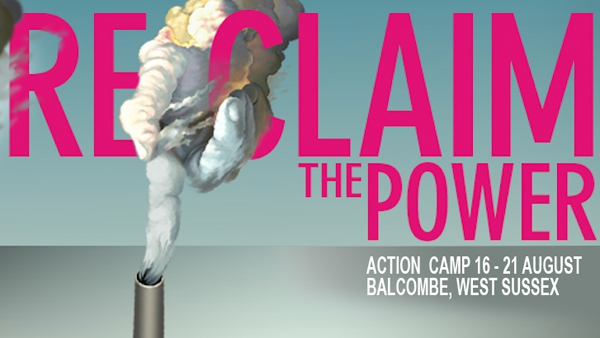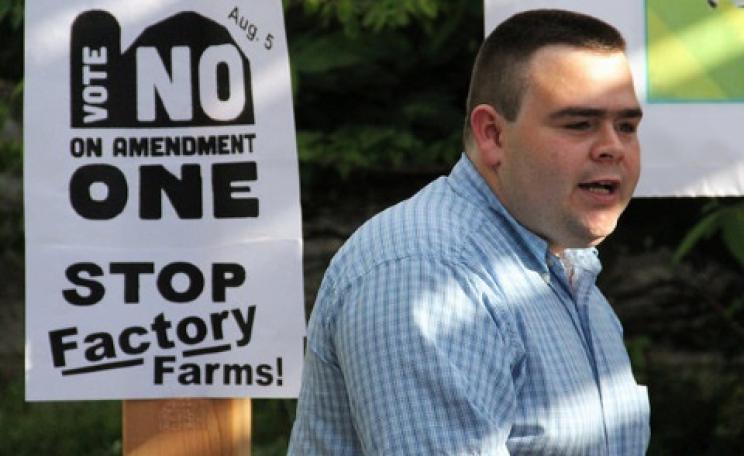Fossil fuel divestment protest at Tufts University. Image courtesy of wikicommons.
Harvard's refusal to divest won't be the end of the matter
By British standards, American universities are unimaginably rich. Thanks to carefully tended endowment funds and a stream of donations from deep-pocketed alumni, US universities are sitting on well over $400 billion in invested assets - of which almost $10 billion is invested in fossil-fuel companies.
Increasingly, colleges' ties to the fossil fuel industry are drawing the attention of climate activists. Emulating past campaigns that persuaded universities to sell off investments in apartheid-era South African firms, and more recently in tobacco companies, students on more than 350 campuses are now pressing university administrators to ditch oil and coal companies and find more eco-friendly investment strategies.
"The logic of divestment couldn't be simpler: if it's wrong to wreck the climate, it's wrong to profit from that wreckage," wrote 350.org founder Bill McKibben, father of the divestment movement, in Rolling Stone. By making fossil-fuel companies politically toxic, McKibben argued, the divestment campaign paves the way for legislative action, and diminishes energy giants' ability to lobby lawmakers. "If institutions like colleges ... turn them into pariahs, their two-decade old chokehold on politics in DC and other capitals will start to slip", he wrote.
The campaign has met with some early successes, with half a dozen small colleges committing to give up their fossil fuel investments. Hampshire College, a small liberal-arts college in Massachusetts, was the first US educational institution to divest itself of fossil fuel investments, as part of a broader shift towards the ethical management of its $35 million endowment.
President Jonathan Lash says that was a moral statement, but one underpinned by sound economics. "Our view as long-term investors ... is that this is not only an ethical approach but an economically sound approach," he explains, noting that the college hasn't lost money as a result of divestment.
Still, campaigners have so far struggled to win over America's wealthiest schools. Last month, the biggest prize of all slipped through their fingers: Harvard University, with an endowment fund of nearly $31 billion, announced that it would continue to invest in fossil-fuel companies. Climate issues should be addressed through research and education rather than through investment-based activism, argued university president Drew Faust in a letter to the Harvard community.
"The funds in the endowment have been given to us by generous benefactors over many years to advance academic aims, not to serve other purposes, however worthy," she added. "The endowment is a resource, not an instrument to impel social or political change."
That's a cop-out, says Hannah Borowsky, a biology junior who leads faculty outreach for the Divest Harvard campaign. "It was disappointing to see such a blatant failure to take leadership," she says. "It's failing to acknowledge the responsibility to address this at a systemic level." (Harvard declined to offer a response, or to make President Faust or other administrators available for interview.)
Harvard's refusal to divest won't be the end of the matter
Harvard's refusal to divest won't be the end of the matter, McKibben told me. "It was entirely expected," he said. "It took Harvard ten years to divest from apartheid-linked companies ... this initial rejection is the signal for activists that they can begin to campaign in earnest." The Divest Harvard campaign is already planning new protests, and will soon establish an escrow fund allowing alumni to make donations that Harvard will receive only after going fossil-free.
Still, divestment campaigners face an uphill struggle. Administrators at other elite institutions including Cornell University, Swarthmore College and the University of Pennsylvania have also resisted divesting their fossil fuel holdings. Stanford University is reportedly discussing divestment with campaigners, but for the moment there's little sign of concrete action.
Even if divestment campaigns do start to win over major investors, critics say, divestment won't deliver the results activists are hoping for. University investments are a drop in the ocean compared with the $4 trillion market capitalisation of the 200 largest fossil-fuel companies, they note, so it's unlikely that companies will feel any direct impact from divestment campaigns.
What's more, if climate-conscious institutions divest, then ownership of energy companies will default to investors who don't care about climate issues, Christianna Wood, a trustee of Vassar College, told the New York Times. It's better, Wood argued, for green institutions to retain ownership interests, and to keep nudging energy companies to invest in renewable technologies. Colleges that divest "not only lose money, they will lose their voice," Wood said.
Divestment campaigners say that misses the point. Divestment isn't intended to bankrupt fossil-fuel companies, but rather to make it less acceptable for policymakers or investors to align themselves with the sector. "There's a bit of a leap of faith you need to take with this kind of campaign," says 350.org spokesman Daniel Kessler. "It sends a strong moral signal ... hopefully that will embolden our policymakers."
That's precisely how previous divestment campaigns achieved their successes, says Ben Caldecott, a University of Oxford researcher who co-authored a recent report on divestment strategies. With a few exceptions, divestment campaigns tend not to have a major impact on companies' bottom lines; instead, they serve to stigmatise companies and even entire industries, driving regulatory change and making investors more aware of risks associated with the sector.
That suggests that campaigners' limited successes to date aren't a sign that the movement is faltering. In fact, Caldecott says, fossil-fuel campaigners are making astonishingly rapid headway. "The campaign has grown much more quickly than any other divestment campaign," Caldecott says. "It has reached some important institutions in a year or two, when previously it might have taken a decade or more."
The next step is to take divestment global. McKibben and other 350.org officials are currently touring the UK in a bid to jump-start campus-based divestment campaigns. That might be a tough sell: Caldecott notes that British schools lack the huge, easy-to-target endowments of their US counterparts, and due to the composition of the FTSE also tend to have portfolios that are markedly more fossil-fuel dependent.
That's true, says 350.org's Kessler, but it's still vital that the divestment movement moves beyond U.S. college campuses and finds a broader audience. "Climate change is a global problem, and we need to be campaigning at a global level," he says. "At the end of the day it's not about the dollar value - it's about the morality of making the decision not to invest in companies that are wrecking the planet."
Ben Whitford is the Ecologist’s U.S. correspondent. He can be reached at mail@benwhitford.com.
| READ MORE... | |
 |
SPECIAL CONTENT Fossil fuel divestment campaign for Europe "Fossil fuel backed stocks and bonds - which are based on long term revenues from fossil energy production - should be downgraded to junk status." |
 |
NEWS ANALYSIS The giants of the green world that profit from the planet's destruction A movement has erupted demanding divestment from fossil fuel polluters – and in their sights are the giants of the green world |
 |
NEWS ANALYSIS Borneo's rainforest coal: City of London profit. The development of coal mines in East Kalimantan is having a huge impact on local and indigenous populations, destroying the forest and displacing communities. London banks and City financiers take the profit. |
 |
SPECIAL CONTENT Reclaim the Power: non-violent direct action Peter Jacobson encourages us to question the power structures within our society, explains why he believes direct action has such an important role to play in the fight against fossil fuel investment, and tells us how to get involved....... |
 |
SPECIAL CONTENT Economic Recovery: Modernising Money Ian Tennant looks at a bid to change the way that money is created so that it can flow to where it is most needed and asks what part will you play in creating a new paradigm for money? |








